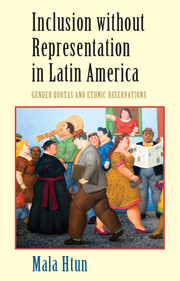Book contents
- Frontmatter
- Dedication
- Contents
- List of Tables and Figures
- Preface and Acknowledgments
- List of Acronyms
- 1 Introduction: Politics of Inclusion in Latin America
- 2 Women, Afrodescendants, and Indigenous Peoples in Elected Office
- 3 Gender Quotas: Why and How?
- 4 Indigenous Reservations and Gender Parity in Bolivia (written with Juan Pablo Ossa)
- 5 Political Inclusion in Colombia
- 6 Brazil: Combatting Exclusion through Quotas in Higher Education
- 7 After Quotas: Women's Presence and Legislative Behavior in Argentina (written with Marina Lacalle and Juan Pablo Micozzi)
- 8 Conclusion
- Appendix 1 Research Trips
- Appendix 2 Mechanisms of Inclusion
- References
- Index
5 - Political Inclusion in Colombia
Published online by Cambridge University Press: 18 December 2015
- Frontmatter
- Dedication
- Contents
- List of Tables and Figures
- Preface and Acknowledgments
- List of Acronyms
- 1 Introduction: Politics of Inclusion in Latin America
- 2 Women, Afrodescendants, and Indigenous Peoples in Elected Office
- 3 Gender Quotas: Why and How?
- 4 Indigenous Reservations and Gender Parity in Bolivia (written with Juan Pablo Ossa)
- 5 Political Inclusion in Colombia
- 6 Brazil: Combatting Exclusion through Quotas in Higher Education
- 7 After Quotas: Women's Presence and Legislative Behavior in Argentina (written with Marina Lacalle and Juan Pablo Micozzi)
- 8 Conclusion
- Appendix 1 Research Trips
- Appendix 2 Mechanisms of Inclusion
- References
- Index
Summary
Colombia is the only country in Latin America with mechanisms of political inclusion targeted explicitly at Afrodescendants and one of the three with reserved seats for indigenous peoples. Both measures originated in the 1991 Constitution, which created two reserved seats for indigenous peoples in the Senate and paved the way for legislation to construct two reserved seats for representatives of “black communities” in the lower house and one seat for indigenous peoples in the same chamber. In 2011, after some twenty years of experience, the Colombian Constitutional Court canceled elections in the reserved seats. Though based on a technicality, the sentence was issued amidst growing criticism of their failure to provide for the effective representation of Afrodescendant and indigenous interests. The Court's decision was challenged and the seats were reinstated in time for the 2014 elections. Yet the ruling was prescient, for the election results were disastrous. The two deputies who won on behalf of “black communities” were not recognized as Afrodescendant and allegedly had ties to drug traffickers, paramilitaries, and politicians jailed for such connections (see Figure 5.1 for photos of María del Socorro Bustamante (a) and Moises Orozco Vicuña (b)) (“¿Por qué se indignaron los negros?,” 2014; Villamizar, 2014).
What went wrong? The 2014 results were disappointing and depressing. But in light of the way the reserved seats were designed, they are not surprising. Electoral institutions did not create formal constituencies of minority voters to elect their own representatives. Instead, all voters nationwide had the option of casting votes for the reserved seats. Rules on ballot access did little to ensure that organizations fielding candidates for the seats had connections to disadvantaged groups and movements advocating their rights, the structure of the ballot was confusing to voters, and there was no upper limit imposed on the number of votes that could be cast.
This chapter shows how the configuration of electoral institutions created conditions for opportunistic political behavior that undermined the purpose of the constitution. Since minority voters were not grouped into special constituencies, politicians contesting the seats solicited votes nationwide and from all social groups, not just black and indigenous voters. Meanwhile, areas of the country where Afrodescendants and indigenous peoples were geographically concentrated tended to support traditional parties rather than cast votes for representatives of reserved seats (Agudelo, 2000, 2002; Escandón Vega, 2011).
- Type
- Chapter
- Information
- Inclusion without Representation in Latin AmericaGender Quotas and Ethnic Reservations, pp. 93 - 120Publisher: Cambridge University PressPrint publication year: 2016



